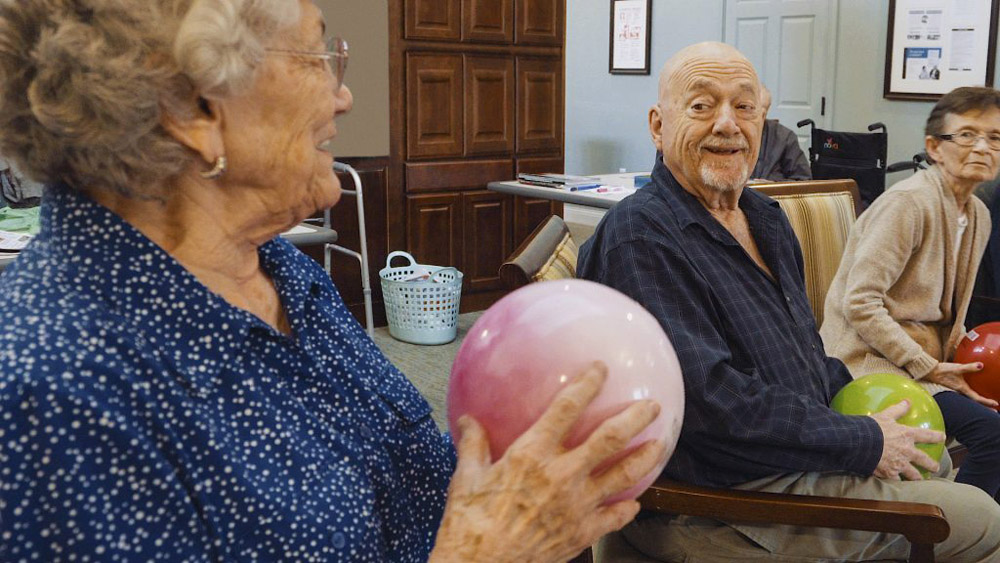Leading Benefits of Memory Care: An Encouraging Environment for Seniors
Memory care centers provide a structured and supportive setting tailored specifically for seniors with cognitive impairments. These specialized settings not only improve safety and protection yet likewise provide individualized care plans that accommodate specific needs. Engaging social tasks and skilled team add to improved psychological wellness and cognitive stimulation, promoting a sense of area. As family members seek reassurance concerning their liked ones' well-being, the value of these programs comes to be progressively obvious. Recognizing the full scope of benefits requires further exploration right into just how memory care truly changes lives.
Enhanced Safety and Security
Among one of the most significant advantages of memory care facilities is their boosted safety and security functions, developed particularly to shield individuals with cognitive disabilities. These centers focus on the wellness of locals by incorporating a range of precaution that mitigate threats linked with straying and accidents. Safe atmospheres usually include checked entry and exit factors, making certain that residents can not leave the properties not being watched, which greatly lowers the danger of obtaining shed or running into hazardous situations.Additionally, memory care centers are geared up with emergency feedback systems, such as call switches and sharp systems, permitting residents to rapidly look for assistance when needed. Personnel are educated to acknowledge the unique difficulties dealt with by individuals with memory-related problems, enabling them to react promptly and successfully to emergencies.Moreover, these centers usually feature formats that minimize complication, with clear signage and acquainted settings that aid in navigating. The visibility of experienced caretakers around the clock even more enhances residents' security, using confidence to both people and their family members. In general, the detailed safety and security and security actions in memory care centers produce a supportive ambience where citizens can flourish while reducing potential threats.

Personalized Care Plans
Because each individual with memory impairment has one-of-a-kind demands and obstacles, individualized care plans are a basic part of efficient memory care. These customized plans are meticulously crafted by a team of medical care experts, including medical professionals, registered nurses, and caregivers, who work together to examine the certain requirements of each homeowner - Memory Care Charlotte. By concentrating on individual choices, medical background, and cognitive abilities, personalized care plans assure that locals receive the appropriate level of support.A crucial aspect of these strategies involves routine evaluations and changes based upon the local's transforming condition. This dynamic strategy permits caregivers to modify treatments, treatments, and day-to-day routines, consequently optimizing the efficiency of care. Furthermore, personalized care plans boost the lifestyle for citizens by including their passions and promoting autonomy, enabling them to engage in activities that reverberate with their personal histories.The application of these plans promotes a sense of protection and trust, as residents and their families feel great that their specific demands are being resolved. Inevitably, personalized care strategies not just support the physical well-being of people with memory disability however likewise contribute meaningfully to their emotional and mental health and wellness, producing a holistic care environment
Engaging Social Activities
Engaging social tasks play an indispensable duty in enhancing the total wellness of individuals with memory disability, matching the personalized care strategies made for their one-of-a-kind requirements. These tasks cultivate links among homeowners, supplying possibilities for socializing, which is vital for psychological health and wellness and cognitive stimulation.Participating in group activities can help in reducing feelings of isolation and isolation that numerous elders experience. Structured experiences, such as art courses, songs therapy, or reminiscence sessions, urge not only communication however also the expression of creative thinking and individuality. Such communications can significantly boost state of mind and increase general life satisfaction.Moreover, involving social activities can boost cognitive function by advertising psychological involvement and focus. Games, challenges, and seminar test residents' reasoning abilities and memory recall, helping to preserve cognitive capabilities for as lengthy as possible.Additionally, these activities usually include physical activity, which is helpful for general health. Gentle exercises or dancing can boost physical well-being while cultivating a sense of neighborhood amongst individuals.
Specialized Memory Support
Specialized memory assistance is essential for individuals encountering cognitive challenges, as it addresses their unique demands through tailored interventions and techniques. This specialized care focuses on numerous kinds of memory impairment, including Alzheimer's disease and various other mental deteriorations, guaranteeing that each resident receives the attention and services needed for their certain condition.Key components of specialized memory assistance include personalized care plans, which are established with detailed analyses of specific abilities and preferences. These plans might involve cognitive therapies designed to boost memory retention, interaction, and daily living abilities. In addition, personnel in memory care facilities are educated to make use of reliable interaction strategies and behavioral administration approaches that promote a supportive environment. Memory Care.Furthermore, specialized memory support usually includes organized regimens and appealing tasks that promote cognitive stimulation and social interaction. This not only boosts the lifestyle for residents yet additionally assists to decrease anxiousness and complication related to cognitive decrease. By prioritizing a caring and comprehending approach, specialized memory support develops an ambience where people can thrive regardless of their challenges, inevitably leading to boosted emotional well-being and a sense of objective in their lives
Household Satisfaction
For families of individuals with cognitive problems, the comfort that originates from recognizing their enjoyed ones are receiving specialized care can be very useful. Memory care centers give a secure atmosphere customized to the special needs of senior citizens with Alzheimer's, dementia, and other cognitive challenges. This specific care enables family members to feel here are the findings confident that their enjoyed ones are in capable hands, profiting from qualified team that understand the complexities of memory-related conditions.The structured routines and interesting tasks offered in memory care setups not only enhance the lifestyle for residents but likewise alleviate the tension and fret generally experienced by family participants. Recognizing that their enjoyed ones are taken part in purposeful interactions and getting individualized interest can substantially decrease anxiety for families.Additionally, memory care centers typically give family members with sources and support, consisting of therapy and academic programs. This empowers households to better understand their loved one's problem and browse the challenges connected with it. Ultimately, the mix of specialist care, a caring environment, and family sustain promotes a complacency, permitting family members to concentrate on treasuring their time with each other without the concern of continuous worry.
Often Asked Concerns
What Certifications Do Memory Care Team Member Typically Have?
Memory care staff members commonly possess specialized certifications to efficiently sustain individuals with cognitive impairments. A lot of have finished training in dementia care, typically holding qualifications in gerontology or an associated area. Additionally, numerous employee have backgrounds in nursing, social job, or psychology, enabling them to supply substantial emotional and physical assistance. Continuous education and learning in the most recent care techniques is likewise usual, making certain team remain notified regarding best practices in memory care.

Exactly How Do Memory Care Facilities Take Care Of Clinical Emergencies?
Memory care centers are equipped to handle medical emergency situations via educated personnel and established procedures. Personnel members typically get training in emergency treatment, MOUTH-TO-MOUTH RESUSCITATION, and specific procedures for managing health dilemmas connected to cognitive disabilities. Memory Care Charlotte. Facilities often work together with neighborhood medical services to guarantee quick feedback times - Memory Care. Additionally, they preserve extensive health records for residents, permitting quick identification of medical demands and proper interventions throughout emergencies, thus guaranteeing homeowners' well-being and security
Are Visitors Allowed any time in Memory Care?
Visitation policies in memory care centers vary by facility. Usually, a lot of facilities motivate friends and family to check out locals, promoting connection and assistance. Nevertheless, particular seeing hours might be carried out to ensure the security and well-being of all homeowners. Facilities usually prioritize structured communications to lessen interruptions to day-to-day regimens and therapeutic tasks. It is advisable for site visitors to check with the center regarding their details visitation standards and any possible restrictions.
What Sorts of Treatments Are Offered in Memory Care Neighborhoods?
Memory care areas typically use a variety of restorative treatments tailored to sustain people with cognitive disabilities. Typical treatments include cognitive stimulation treatment, art and music therapy, and memory treatment, which urge interaction and emotional expression. Additionally, physical treatment may be offered to boost movement, while occupational therapy concentrates on daily living skills. These structured activities intend to advertise cognitive function, improve state of mind, and foster social links amongst residents, producing a holistic approach to care.

Exactly How Is Medication Monitoring Conducted in Memory Care?
Medicine monitoring in memory care neighborhoods is carried out through an organized approach to ensure the safety and security and wellness of homeowners. Trained personnel supervise the management of medications, adhering to prescribed dosages and routines. Normal analyses are performed to monitor efficiency and potential negative effects. Furthermore, caretakers preserve clear interaction with medical care carriers and family members, guaranteeing that any type of adjustments in wellness condition are promptly dealt with, consequently maximizing the overall care procedure for people with cognitive problems.